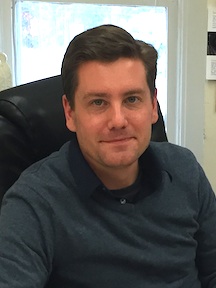By Alexandra Zigomalas
Peter Locke (ΦBK, University of Virginia, 2000), a cultural and medical anthropologist at Northwestern University, applies humanity, knowledge, and a global perspective to teach students about important issues in global health.
During his freshman year at the University of Virginia, Locke gravitated toward the field of cultural anthropology after taking an introductory level course. “I really connected with its critical perspective towards mass and mainstream culture,” Locke commented. “I grew up a little nerdy and alienated, so I was looking for a social science with an edge that could help me understand dynamics of power, equality, ideology, etcetera in the world around me.”
With a degree in anthropology and a new perspective on global ideas, Locke went on to pursue a PhD in anthropology at Princeton University. As a graduate student, he wanted his scholarship to be a part of a much larger conversation on issues of inequality, poverty, and conflict. “As for many middle class American students, college for me was an eye opening experience of seeing just how much extreme inequality there is in the world and how much suffering it produces,” Locke said. “With that kind of awakening, in graduate school I really wanted to find research and scholarship that was engaged with major social and political problems and could say something interesting and useful about those kinds of challenges.”
Because of his desire to create meaningful and important research, Locke studied the breakup of Yugoslavia and its impact on local communities left traumatized after years of violence. “For me I was really drawn to the study of conflict and post-conflict processes of social repair,” Locke recalled. “It seemed incredibly meaningful, rich, and fascinating to me the ways in which people who survived something like the violent disintegration of Yugoslavia in the early 1990s.” Locke also stated that his research led him to ask the following question: “What is it like to have to heal with and cope with that level of trauma while building a new and livable society in the wake of that kind of violence?”
With this and many other questions in mind, Locke did his field research in Sarajevo, Bosnia-Herzegovina. Sarajevo in particular was subject to the longest military siege in modern history and was subject to intense violence on a daily basis. While in Bosnia-Herzegovina, Locke immersed himself in the culture and language of the country. He used ethnographic research to learn how people survived this level of violence that was unprecedented in a modern context. He also expanded his understanding of cultural anthropology by considering issues of one of the field’s subsets—medical anthropology. Through a medical anthropological lens, Locke was able to look at healing traditions, psychology, and what everyday people went through in a both a conflict and post-conflict society. His dissertation centered on the legacy and impact of humanitarian psychiatry and psychosocial support services in Sarajevo for people who were left with PTSD.
Locke remained at Princeton after completing his PhD for a postdoctoral fellowship in Global Health Studies. As a part of the program, he took undergraduates to rural Sierra Leone for eight weeks in the summer to study issues of global health and inequality through firsthand ethnographic research. Sierra Leone was still recovering from a devastating civil war in the 1990s. Locke described the experience as, “one of the most profound and transformative experiences of my life and of my career.” Through mentoring students, Locke was able to help students better understand the social consequences of global inequality in post-colonial societies. Locke reflected on the experience and on its demanding challenges. “It demanded my full humanity to sense what students were going through,” he said. Locke also had to work hard to make sure that students did not become hopeless and abandon the field of anthropology because of the problems they were witnessing. He had to help these students see that they could use their life’s work to address these issues and create change. Locke also felt the responsibility that universities have to make these types of trips ethical. He described a troubling example of 18 year olds who deliver babies in developing countries and boast about it on social media. These events are not only unethical, but also reflect problematic, post-colonial relationships.
Relocating to Northwestern in 2014 to work for both the anthropology department and the Global Health Studies minor, Locke spearheaded a study abroad program focusing on health and mental health issues in Southeastern Europe, particularly in Serbia and Bosnia-Herzegovina. In this program, students get to take classes in these countries, to work closely with NGOs, and to understand issues of physical mental and global health. Locke described his goal as to “prepare a new generation of global health leaders to think across cultures and across societies’ health systems, and how they will address global health inequalities.”
A passionate and conscientious scholar and a proud member of Phi Beta Kappa, Locke feels a great responsibility to continue mentoring students who are not only in the honor society, but who are also interested in issues of global health.
Alexandra Zigomalas is a junior at Stony Brook University double majoring in history and art history. Stony Brook University is home to the Alpha Beta of New York Chapter of Phi Beta Kappa.




